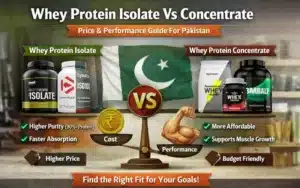No products in the cart.
Return To ShopWhat is Whey Protein Concentrate? Benefits & Uses
Protein is the cornerstone of nutrition, pivotal for muscle repair, immune health, and overall bodily function. Among the pantheon of protein supplements, whey protein stands as a revered choice. Derived from milk during cheese production, whey is a powerhouse of amino acids, offering remarkable bioavailability that few natural proteins can rival.
What is Whey Protein Concentrate?
Whey protein concentrate (WPC) is a form of whey protein that retains a higher percentage of naturally occurring nutrients compared to its counterparts. Typically containing 70–80% protein, WPC also includes small amounts of fats, carbohydrates, and bioactive compounds that amplify its nutritional appeal. This makes it a well-rounded supplement for those seeking both performance and wellness.
How is Whey Protein Concentrate Made?
The journey of whey protein concentrate begins at the dairy. After milk is curdled and strained during cheese-making, the liquid whey is filtered to remove water, lactose, and ash.
This filtration process ensures that the protein remains intact, while concentrating its essential nutrients. The resulting powder is then spray-dried, creating the final, shelf-stable product.
Nutritional Composition of Whey Protein Concentrate
WPC is a nutritional powerhouse. Rich in branched-chain amino acids (BCAAs) like leucine, isoleucine, and valine, it supports muscle repair and growth. It also boasts immunoglobulins and lactoferrin, which enhance immune function. While higher in fats and carbohydrates than whey protein isolate, these components contribute to its creamy texture and balanced profile.
Here’s a table representing the Nutritional Composition of Whey Protein Concentrate:
| Nutrient | Amount (per 100g) | Key Benefits |
| Protein | 70–80g | Muscle repair, growth, and recovery |
| Branched-Chain Amino Acids (BCAAs) | ~20g | Supports muscle synthesis and reduces fatigue |
| Fats | 4–8g | Provides energy and contributes to creamy texture |
| Carbohydrates (including Lactose) | 8–10g | Sustained energy release |
| Immunoglobulins | Trace amounts | Boosts immune function |
| Lactoferrin | Trace amounts | Enhances iron absorption and immune health |
| Calcium | ~200mg | Supports bone health |
| Sodium | ~50mg | Regulates fluid balance and muscle function |
This composition varies slightly between brands and formulations, so always check the product label for specific details.
Benefits of Whey Protein Concentrate
The benefits of WPC are manifold.
- Enhances Muscle Recovery: Provides essential amino acids that aid in repairing and building muscle tissue.
- Supports Weight Management: Promotes satiety and helps maintain a healthy body composition.
- Boosts Immune System: Contains immunoglobulins and lactoferrin, which enhance immune defense.
- Sustained Energy Release: Slower digestion compared to whey isolate provides a steady energy supply.
- Ideal for Athletes: Combines performance support with recovery benefits.
- Gut Health Support: Bioactive compounds in WPC may improve digestion and gut health.
- Antioxidant Properties: Contributes to reducing oxidative stress and supporting overall wellness.
Comparing Whey Protein Concentrate with Other Protein Types
WPC stands apart from other protein supplements like whey protein isolate and casein. Unlike isolate, which is nearly pure protein, WPC retains a more comprehensive nutritional profile.
Casein, on the other hand, digests slower than WPC, making it ideal for prolonged protein release. WPC occupies the middle ground—affordable, versatile, and nutritionally robust.
Common Uses of Whey Protein Concentrate
WPC’s versatility shines in its applications. It is widely used in shakes, smoothies, and baked goods, providing a protein boost without overpowering flavors.
Athletes incorporate it into post-workout routines, while health-conscious individuals use it to supplement their daily diets. From pancakes to protein bars, WPC is a culinary chameleon.
How to Choose the Right Whey Protein Concentrate for Your Needs
Selecting the ideal WPC involves scrutinizing labels for protein content, additives, and sourcing. Look for products with minimal fillers and artificial sweeteners.
Consider factors like flavor, solubility, and dietary compatibility (e.g., gluten-free or halal certifications) to ensure it aligns with your lifestyle and goals.
Potential Side Effects and Considerations
While WPC is generally safe, some individuals may experience mild bloating or digestive discomfort due to lactose. Those with dairy allergies should exercise caution or opt for plant-based alternatives. Moderation is key—overconsumption can lead to imbalances or strain on the kidneys over time.
The Role of Whey Protein Concentrate in Modern Nutrition
Whey protein concentrate is more than a supplement; it’s a nutritional ally. Its balanced profile, affordability, and versatility make it a staple for athletes, fitness enthusiasts, and everyday health seekers.
Whether you’re crafting a protein-packed breakfast or fueling post-workout recovery, WPC delivers nourishment with unmatched efficacy.









Add comment